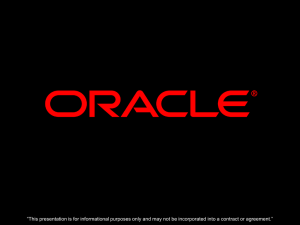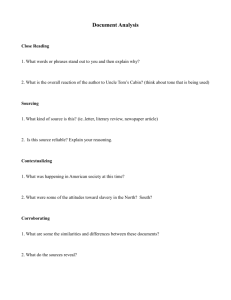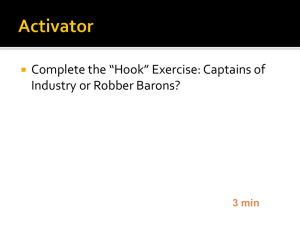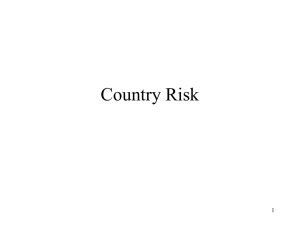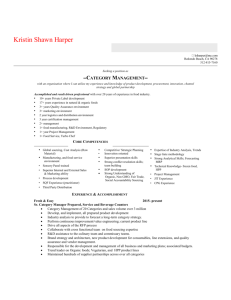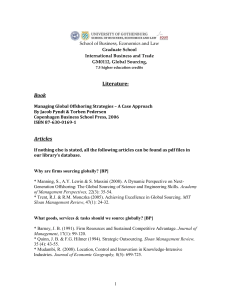MGSC 871 Global Sourcing Strategies and Applications Instructor
advertisement
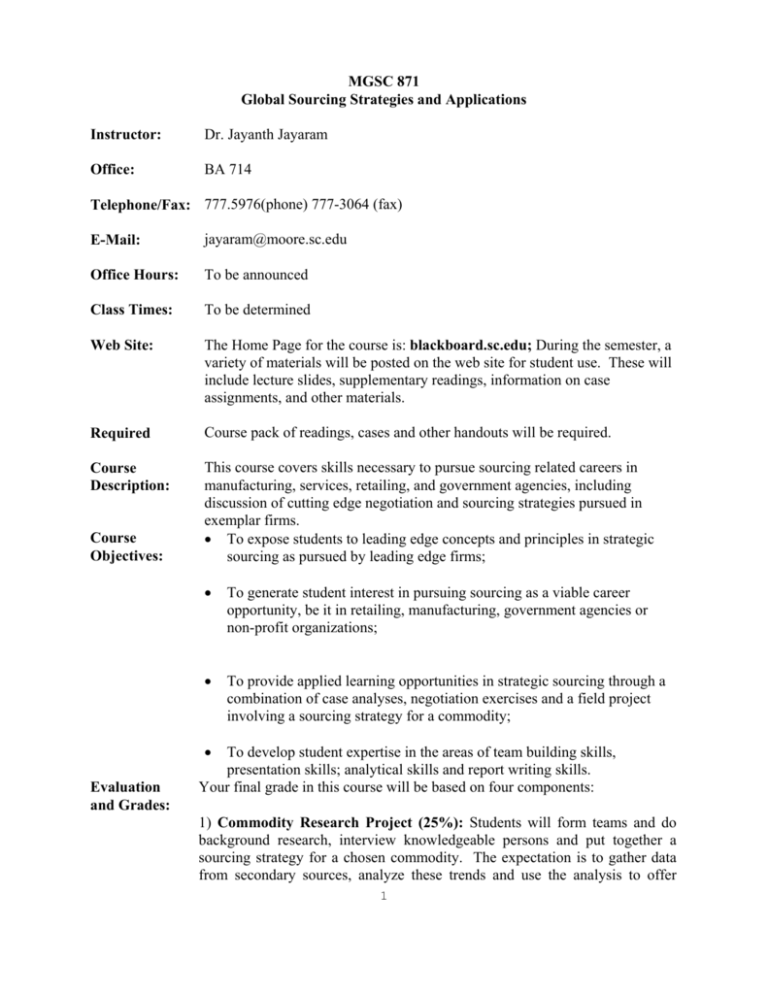
MGSC 871 Global Sourcing Strategies and Applications Instructor: Dr. Jayanth Jayaram Office: BA 714 Telephone/Fax: 777.5976(phone) 777-3064 (fax) E-Mail: jayaram@moore.sc.edu Office Hours: To be announced Class Times: To be determined Web Site: The Home Page for the course is: blackboard.sc.edu; During the semester, a variety of materials will be posted on the web site for student use. These will include lecture slides, supplementary readings, information on case assignments, and other materials. Required Course pack of readings, cases and other handouts will be required. Course Description: This course covers skills necessary to pursue sourcing related careers in manufacturing, services, retailing, and government agencies, including discussion of cutting edge negotiation and sourcing strategies pursued in exemplar firms. • To expose students to leading edge concepts and principles in strategic sourcing as pursued by leading edge firms; Course Objectives: • To generate student interest in pursuing sourcing as a viable career opportunity, be it in retailing, manufacturing, government agencies or non-profit organizations; • To provide applied learning opportunities in strategic sourcing through a combination of case analyses, negotiation exercises and a field project involving a sourcing strategy for a commodity; • Evaluation and Grades: To develop student expertise in the areas of team building skills, presentation skills; analytical skills and report writing skills. Your final grade in this course will be based on four components: 1) Commodity Research Project (25%): Students will form teams and do background research, interview knowledgeable persons and put together a sourcing strategy for a chosen commodity. The expectation is to gather data from secondary sources, analyze these trends and use the analysis to offer 1 commodity-specific sourcing strategies along with contingency planning. Students will also be exposed to tools such as risk mitigation strategies. This is a group exercise. 2) Negotiation Exercise (15%): Students will engage in a simulation exercise that will mimic a hypothetical negotiation exercise. The expectation is to write a short summary of each team’s negotiation tactics and share it with the class. This is a group exercise. 3) Case Analysis/Cost Management Exercise (20%): You will be required to submit written case analyses for a few cases that illustrate one or more principles of effective sourcing strategies. In addition, you will be required to submit responses to a cost management exercise. You can work in groups for case analyses/cost management exercise and turn in one report. 4) Exam (40%): There will be two exams in this course. The mid-term is worth 20% and the final exam (during finals week) is worth 20%. GRADING SCALE A = 90% or higher B+ = 87-89.99% B = 80-86.99% C+ = 77-79.99 % C = 70-76.99% D+ = 67-69.99 D = 60-66.99 F = under 60 Group Work: Several of the components that will determine your grade for this course will be group-based work. Groups will consist of five or six students, and the same groups will be used for all group work in the course. You may self-select your group by sending an e-mail with the names of all group members to the instructor before 5:00 pm Wednesday, September 5. Your group must have at least five members. Any students not part of a self-selected team by September 5 will be assigned a group by the instructor. Every group member is expected to carry his/her share of the group’s workload. Peer evaluations will be collected at the end of the course, group members who are not doing their share will have their grades adjusted downwards for the course. It is suggested that each group select a liaison person to interact with the instructor and update me if there are non-participants in our group early enough to send warnings. Group Sourcing Strategy Project/Best Practices Case Study: Each group will conduct a comprehensive commodity/purchase family sourcing strategy project on a commodity or purchase family of the group’s choice (subject to approval by the instructor). The due date for emailing the commodity selected by your group is Sept 19 by 5pm. Each team will make a formal research proposal about their commodity sourcing project (10 min) to the class on October 1. The sourcing strategy project will include significant research about the chosen commodity/purchase family, or conduct 2 detailed investigation of a best practice case study resulting in a written project report and a short (15-20 minute) presentation on the project towards the end of the course. The written report will be due no later than December 13 (day of final exam). Groups are expected to use all relevant concepts presented during lecture and in assigned readings in the development of the sourcing strategies. Further details on the project will be handed out and discussed in class. Group Work: Group Case Write-up: Each group will submit written analyses for two cases - the “Emerson Electric Case” and the “Pacific Systems Case” for grading. Guidelines for case writeups will be posted on the course web site. Group Homework Exercises: Each group will complete a “Cost Management Exercise” and a “Negotiation Exercise”. Specifics of these exercises will be handed out and discussed in class. Also, there will be several homework assignments requiring the use of spreadsheet analyses. Attendance: Class attendance is required. I realize that at times you may have legitimate reasons (university approved) for missing class. I would appreciate an e-mail when you know you are going to miss class. It is your responsibility to obtain notes from your peers. Excessive absences will negatively affect your course grade. Makeup and Free Rider Policy There are no makeup assignments in class. Homework assignments, case analyses and exams cannot be made up and students missing assignment due dates or exams earn an automatic zero. If you have an university approved excuse that conflicts with our exam date, you need to let me know in advance along with the proof to be considered for a possible makeup exam. No makeup exam will be given after the scheduled exam date. If you do not participate adequately in team efforts, your grade will suffer. If you have excessive absences in the class, even if it is for university approved reasons, you cannot makeup in-class activities. In such rare circumstances, you need to contribute ahead to your group and keep me informed. I will not accept excuses after the fact when you decide to not participate on your own. Please do not test this policy. 3 CLASS SCHEDULE* Date: Week 1 Topic: Course overview and Introduction to Purchasing Week 2 Purchasing process Due: E-mail instructor group composition Reading: Reading: Strategic Supplier Segmentation Reading: How Delphi went lean Week 3 Purchasing and Supply Organization Case: Bose Corporation Week 4 Purchasing and commodity strategy development Due: E-mail Topic for Commodity Sourcing/Best Practices Project to instructor Reading: Rethinking raw materials Reading: Managing commodity spend in turbulent times Case: FlexCon Piston Case Week 5 Week 6 Supplier evaluation and selection Reading: Identifying and Evaluating Chinese Suppliers Commodity Sourcing Project Proposal Presentations (All teams) Case : Pacific Systems Graded Reading: Supply Base Reduction within supply base reduction. Supplier quality management Case: Electronic Systems Reading: Measuring Supply Risk: An Example from Europe Week 7 Supplier risk assessment Week 8 Midterm Exam Week 9 Supplier management and supplier development Week 10 Reading: Avoid the Pitfalls in Supplier Development. Case: Avion Reading: What you need to know about sourcing from China Global sourcing Case: Wire Harness Decision 4 CLASS SCHEDULE* Date: Week 11 Global Sourcing Week 12 Strategic cost management Week 13 Topic: Reading: Case: Emerson Electric Graded Reading: How Sainsbury's Transformed Its Supply Chain Case: Cost Management Graded Reading: Seven effective habits of negotiation. Negotiation Reading: Negotiation Strategies of US purchasing professionals. Week 14 Negotiation Negotiation Exercise Week 15 Future Issues Reading: IBM supply efforts towards sustainability Purchasing Ethics Reading: Global Sourcing and Guanxi Week 16 Project Presentations Finals Week Final Exam We may be ahead or behind this schedule. In addition, articles pertaining to some chapters will be distributed in advance. 5
